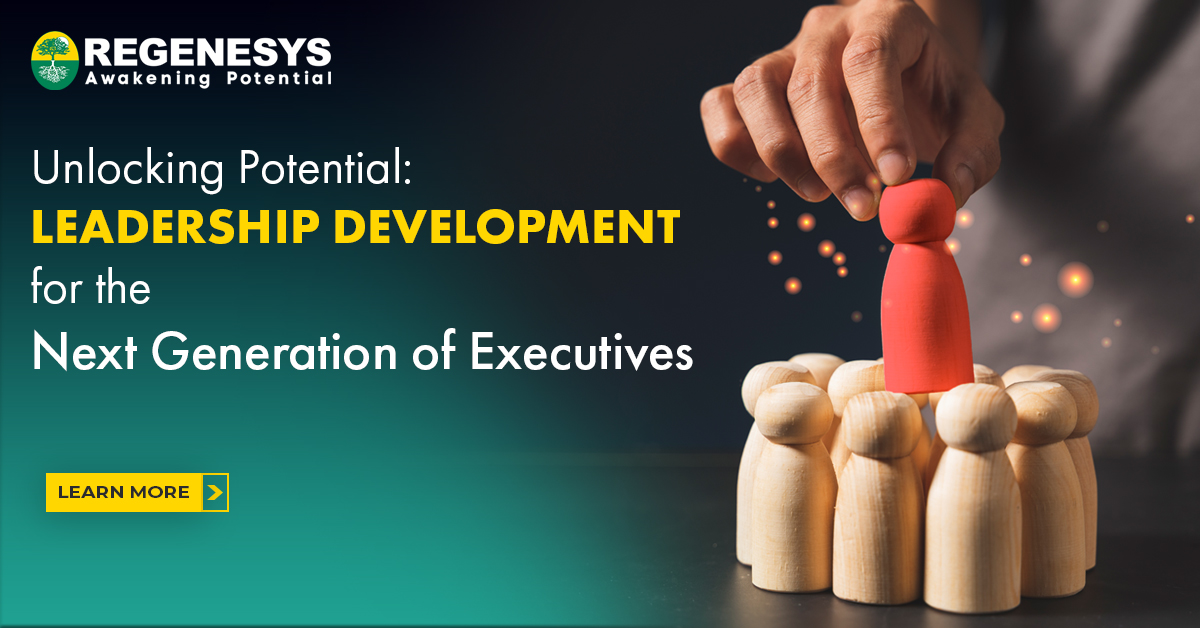In today’s rapidly evolving business landscape, organisations constantly seek influential leaders to guide their teams towards success. As industries become increasingly competitive, the need for strong leadership has never been more crucial.
In this article, let us learn the importance of leadership development and how it plays a vital role in shaping the next generation of executives.
In This Article:
- What Are Leadership Development Programmes?
- Benefits Of Leadership Development Programmes.
- Leadership Development: Shaping The Next Generation Of Executives.
What Are Leadership Development Programmes?
Leadership development programmes (LDPs) are structured initiatives or training efforts programmes. These programmes are designed to enhance the following:
- Capabilities,
- Leadership skills and
- The prospect of individuals within an organisation.
These programmes aim to:
- Identify,
- Nurture and
- Develop future leaders.
As they can effectively guide and inspire others to achieve organisational goals.
Leadership development programmes are tailored to an organisation’s specific needs and objectives.
Here are the key components and objectives of Leadership development programmes:
Identifying Potential Leaders:
These programmes often begin with identifying employees who prove leadership potential.
This identification can be based on:
- Skills,
- Behaviours,
- Performance, or
- A combination of these factors.
Leadership Skills Enhancement:
Leadership development programmes focus on developing leadership skills and competencies.
These skills include:
- Adaptability.
- Communication,
- Decision-making,
- Strategic thinking,
- Conflict resolution and
- Emotional intelligence.
Structured Training:
Participants in leadership development programmes typically undergo structured training, which may include:
- Workshops,
- Seminars,
- Online courses and
- Coaching sessions.
These programmes may be delivered in-house or by external experts.
Mentoring and Coaching:
Many leadership development programmes include mentorship or coaching components.
Experienced leaders within the organisation may mentor participants, providing guidance, feedback, and support.
360-Degree Feedback:
Participants often receive feedback from peers, subordinates, and supervisors.
This helps in comprehensively understanding their leadership strengths and areas for improvement.
Experiential Learning:
Leadership development programmes often incorporate experiential learning opportunities, such as:
- Job rotations,
- Team projects, or
- Leadership simulations.
It helps participants apply and reinforce their leadership skills.
Self-Awareness and Personal Development:
Leadership development programmes encourage participants to reflect on their:
- Goals.
- Values and
- Leadership styles.
This self-awareness is critical for effective leadership.
Cultural Alignment:
Effective leadership development programmes align with the
- Values,
- Strategic goals and
- Organisation’s culture.
This ensures that the leadership skills acquired are relevant to the specific context.
Succession Planning:
Leadership development programmes are often linked to succession planning. The organisation prepares individuals to fill key leadership positions as current leaders retire.
Evaluation and Measurement:
The effectiveness of LDPs is often assessed through:
- Employee surveys,
- Performance metrics and
- Other evaluation methods.
This gauges the impact of leadership development efforts.
Diversity and Inclusion:
Many organisations emphasise diversity and inclusion in their leadership development programmes. These ensure a diverse pool of future leaders that reflects the broader workforce and society.
Thus, leadership development programmes are more comprehensive than top executives. It can target leaders at various organisational levels, from frontline supervisors to mid-level managers.
Effective leadership development contributes to the following:
- Employee engagement,
- Improved organisational performance and
- The ability to respond to evolving business challenges.
Benefits of Leadership Development Programmes
Effective leadership has become increasingly important in today’s rapidly evolving business landscape. Successful organisations understand the importance of investing in leadership development programmes.
The Leadership development programmes help in::
- Equip the leaders with the necessary skills
- Cultivating the next generation of executives,
- Help organisations to identify and groom future leaders and
- Competencies to navigate the challenges of a dynamic and competitive marketplace.
Leadership development programmes catalyse growth and success for individuals and organisations. By focusing on developing the potential of high-potential employees, these programmes create a pipeline of talented leaders who can drive innovation, motivate teams, and guide their organisations towards achieving their strategic objectives.
One of the critical benefits of leadership development programmes is the ability to identify and nurture leadership potential within an organisation.
These programmes provide a structured framework for assessing individuals’ strengths, weaknesses, and leadership capabilities.
By identifying promising leaders early on, organisations can strategically invest in their development, ensuring a seamless transition into executive roles in the future.
Furthermore, leadership development programmes offer participants unique opportunities to enhance their leadership skills and broaden their perspectives.
Aspiring leaders can strengthen their:
- Communication,
- Decision-making,
- Strategic thinking and
- Emotional intelligence abilities through:
- Seminars,
- Workshops,
- Mentoring and
- Experiential learning.
Thus, lleaders gain valuable insights into different leadership styles and approaches, enabling them to adapt to diverse and complex business environments.
Another significant advantage of leadership development programmes is the emphasis on building a robust network of professionals.
Participants can interact and collaborate with fellow aspiring leaders from various industries and backgrounds. This networking aspect fosters the following:
- Exchange of ideas,
- best practices, and
- innovative solutions.
This networking aspect enables participants to broaden their horizons and gain fresh perspectives.
These connections often extend beyond the programme, creating a lifelong support system that can be invaluable in their leadership journey.
Moreover, leadership development programmes help organisations address the critical issue of succession planning.
By systematically developing a pool of talented executives, organisations can mitigate the risks associated with leadership gaps and ensure a smooth transition when key leaders retire or move on.
This proactive approach minimises disruption and instils confidence in stakeholders and investors, showcasing the organisation’s commitment to long-term sustainability.
Leadership Development: Shaping The Next Generation Of Executives
The importance of leadership development and its vital role in shaping the next generation of executives.
Understanding the Power of Leadership Development:
Leadership development enhances an individual’s leadership abilities through various:
- Mentoring,
- Training programmes and
- Continuous learning opportunities.
LDPs is a proactive approach that helps individuals build the necessary skills, knowledge, and mindset to lead confidently and effectively.
Nurturing Future Executives:
Leadership development programmes focus on identifying and nurturing potential leaders within an organisation.
By investing in their growth, companies can cultivate a pipeline of talented individuals who possess the necessary skills to step into executive roles in the future.
These programmes not only benefit the individual but also contribute to the long-term success of the organisation.
Building a Strong Leadership Culture:
Leadership development initiatives foster a strong leadership culture within an organisation.
By emphasising the importance of leadership at all levels, companies can create an environment where employees are encouraged to:
- Take initiative,
- Make informed decisions, and
- Collaborate effectively.
Such a culture promotes innovation and employee engagement, enhancing performance.
Encouraging Continuous Learning:
Leadership development is an ongoing process that encourages continuous learning.
Executives must stay up-to-date with industry trends, technological advancements, and evolving business practices.
Organisations can support their leaders in expanding their knowledge base and staying ahead of the curve by providing:
- Access to resources,
- Mentoring programmes and
- Networking opportunities.
The Bottom Line
In today’s fast-paced business environment, organisations need strong and capable leaders to thrive. Leadership development programmes play a critical role in shaping the next generation of executives by:
Nurturing talent,
Building a strong leadership culture and
Developing essential skills.
By investing in leadership development, organisations can ensure a sustainable pipeline of well-equipped leaders to guide their teams and drive success in an ever-changing world.
Stay tuned with Regenesys Business School and explore more about leadership development programmes.
Learn essential skills that promote inclusivity and drive high productivity in the modern workforce with the Regenesys business administration courses, business management degree and other trending programmes.
Enhance productivity and inclusivity with our MBA – masters in business administration programme, designed and facilitated by industry and subject matter experts.
Regenesys Business School has proven to be one of the fastest-growing and leading MBA business schools, providing management, business, and business administration courses. Sign up @ Regenesys Business School to learn more about the MBA programme.
FAQs – Frequently Asked Questions: Leadership Development: Shaping The Next Generation Of Executives
What is a Leadership development programme?
Answer: Leadership development programmes catalyse growth and success for individuals and organisations. This programme plays a pivotal role in shaping the next generation of executives.
Are leadership development programmes limited to top executives?
Answer: No. Leadership development programmes are not limited to top executives. It can target leaders at various levels within an organisation, including:
- Frontline supervisors
- Mid-level managers and more.
What is the primary benefit of a Leadership development programme?
Answer: The primary benefit of the Leadership development programme is that it improves your decision-making and cross-functional skills.
What entry requirements are required for Regenesys Business School’s Leadership development programme?
Answer: The entry requirements required for Regenesys Business School’s Leadership development programme include:
- A tertiary qualification is recommended,
- 3-5 years experience in a middle or senior management role,
- Sound knowledge and acumen of business finance are recommended.
Click here to learn more about the Regenesys Business School’s Leadership development programme’s entry requirements.
Why study Regenesys Business School’s Leadership Development Programme?
Answer: The Regenesys Business School’s Leadership development programme develops strategic management and leadership competencies for managing large organisations.
The Programme Structure include:
- Face to Face: 15 contact days contact over four months
- Virtual: weekly sessions over eight months. *Four Hours per virtual session
Click here to learn more about the Regenesys Business School’s Leadership development programme.







